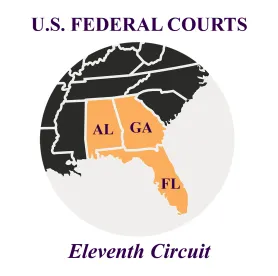Federal district court orders remanding cases to state court are generally not appealable, as provided by 28 U.S.C. § 1447(d). One exception to this is that the Class Action Fairness Act (CAFA) allows a court of appeals, in its discretion, to accept an appeal from an order granting or denying a motion to remand a putative class action. 28 U.S.C. § 1453(c). The courts of appeals can decline to hear an appeal under § 1453(c), and they are selective about hearing these appeals, particularly because if they accept one, they have to rule within 60 days (subject to an extension of time if either agreed by the parties or limited to ten days). A recent Eleventh Circuit decision pointed out, however, that there are narrow circumstances where a party can appeal as of right from a remand order in a putative class action — where the order is based on CAFA’s “local controversy” or “home state” exception.
In Simring v. Greensky, LLC, — F.4th –, 2022 WL 894206 (11th Cir. Mar. 28, 2022), the district court remanded a putative class action based on the “local controversy” exception, which provides that a district court shall decline jurisdiction where more than two-thirds of the members of all proposed classes are citizens of the state where suit is filed and certain other requirements are satisfied (there is at least one in-state defendant from which significant relief is sought and whose contact forms a significant basis for the claims alleged, the principal injuries were incurred in that state, and no other class action asserting the same or similar factual allegations against any of the defendant has been brought within the last three years). 28 U.S.C. § 1332(d)(4). In Simring, the district court interpreted the complaint as limiting the proposed class to Florida citizens, and because the other requirements for the “local controversy” exception applied, remanded the case to state court.
The Eleventh Circuit held that the district court’s decision was appealable as of right because “CAFA’s local controversy exception does not implicate subject matter jurisdiction” and thus 28 U.S.C. § 1447(c) and (d), which generally prohibit appeals of remand orders, were not applicable. Rather, “the local controversy exception is ‘akin’ to abstention,” a basis for remand that is appealable, “because it requires courts to decline jurisdiction that otherwise exists.”
The Eleventh Circuit went on to reverse the district court’s order because the class definition was not limited to Florida citizens, despite the fact that other allegations in the complaint indicated that suit was being brought “on behalf of all other Floridians similarly situated.” The plaintiff had the burden of proof on the applicability of the local controversy exception, and did not present any evidence of the citizenship of the putative class members.
The key point here for class action practitioners is that there are circumstances where a remand order is appealable as of right under CAFA. Where that is the case, you would not want to file a petition for permission to appeal, which could be denied for any number of reasons. This decision is also significant in emphasizing that the definition of the class, rather than other allegations in the complaint, may control the analysis of whether the local controversy (or home state) exception applies.



 />i
/>i


